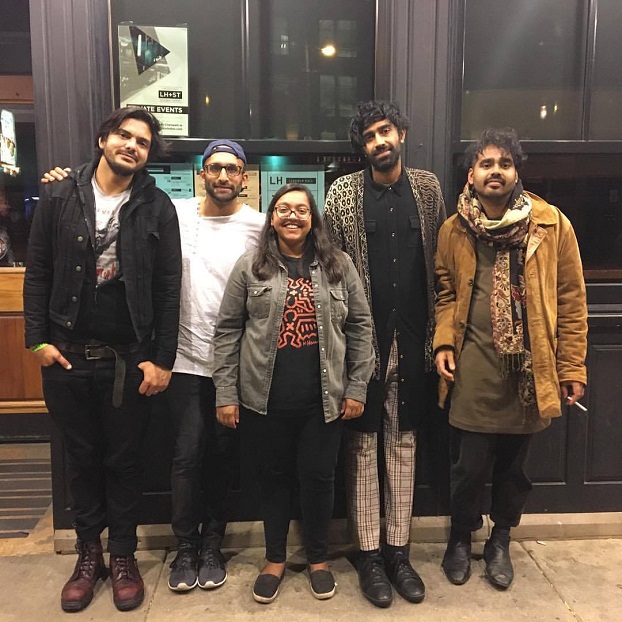
The Kominas are one of those groups for whom life sometimes imitates art. On the last leg of their most recent tour, heading to their last show with Sinkane in Chicago, the punk band members were detained and questioned for two hours by U.S. authorities at the Canadian border. The guys were asked if they liked living in America and confronted with photos found on social media of their “wild” early days. One border agent bought a “Pigs Are Haram” sticker from the group and then sent them on their way.
But when the band played at Lincoln Hall later that evening, they didn’t seem phased. In fact, they had a lot of fun during their set and so did the audience. The Kominas are serious musicians, and very down-to-earth guys. When I talked to them after the show, they were pissed off about getting stopped and interrogated, but had also laughed during their performance while recounting the border incident to the crowd.
Being a band for 12 years might have something to do with the ease with which The Kominas handle road bumps together. They’ve recorded four albums in that time — with a fifth one on the way — and toured multiple times nationally and internationally. Guitarist Shahjehan Khan attributes this longevity, in part, to The Kominas’ naturally redefining and evolving their approach to making music as they go.
“The band had already paid for studio time and were in the midst of recording when Executive Order 13769 was issued.”
Bass player and vocalist Basim Usmani calls their upcoming album The Kominas’ “best written music so far,” and acknowledged what a long and somewhat difficult process it was to work through. The band had already paid for studio time and were in the midst of recording when Executive Order 13769 was issued, banning people from entry into the U.S. from Iran, Iraq, Libya, Somalia, Sudan, Syria, and Yemen.
For a group of desis whose music leads with politicized messaging, it was frustrating to have to stay in the studio when people were out in the streets, protesting xenophobia and helping those detained at airports. This is a band that has spent over a decade carving space for brown punk fans as well as motivating musicians of color in a white dominated music scene.
Listen to The Kominas latest single “No Fun” from their upcoming album and find tracks from their other albums on Bandcamp.
When they started, The Kominas were interested in “cultivating an imagined community…a radical desi community” through their sound and lyrics. Recording at the beginning of 2017, Usmani felt that the music they were making became symbiotic with what was happening in the world. “It was this really Kafka-esque moment where we were like ‘well I guess we’re gonna have to do it [speak out] from the studio.’ And the music elevates the message, and the message elevates the music.”
The Kominas have the freedom to produce exactly the kind of music they want to, thanks in part to remaining independent and unsigned by a major label for all these years. In our interview, Khan shared his hopes of securing a wider distribution for their fifth album, and coinciding the release with an international tour. In the meantime, he said, they’d like to recuperate from being on the road almost nonstop for the last few months.
“And the music elevates the message, and the message elevates the music.”
“I’m proud of this tour, touring in general is very hard. There’s no job security and it’s definitely a hustle. You don’t get to go to band school, graduate and then everything falls into place. But it’s really beautiful 5 percent of the time, and I’m grateful for that.”
Usmani also thanked his cousins Zainab and Amna Akbar for their influence on his early ideas about pursuing music. These older relatives had been in a band, and they evolved from music to activism, going to school and becoming lawyers. Along the way they imparted their wisdom of issues like feminism to their younger cousin. According to Usmani, “there would be no Kominas without [them].”
These early, progressive influences combined with the band members’ personal convictions have informed The Kominas’ music. Their repertoire spans across a spectrum of themes, including racial profiling (“Freedom”), identity surveillance (See Something Say Something), religion (“Eid Mubarak”), humor (“Disco Uncle”) and romance (“Banana”). Listeners can hear songs laced with everything from punk rock (“Sharia Law in the USA”) to psychedelic (“We Got Time”) and even Bollywood covers. (“Choli Ke Peeche”).
Constantly evolving while remaining true to their motivations has served the Kominas well since starting in 2005. With this upcoming album, they’re poised to continue carving a significant space in music, all while having fun and shrugging off the authoritarian haters.

* * *
Anjali Misra is a Chicago-based nonprofit professional and freelance writer of media reviews, cultural criticism and short fiction work. She earned her MA in gender and women’s studies from the University of Wisconsin-Madison, where she spent nine years as a student and community organizer, focusing on inter-ethnic solidarity, interracial coalition building, and gender justice. She is an avid sci-fi media fan, and Ms. Marvel/Kamala Khan is her patronus.












